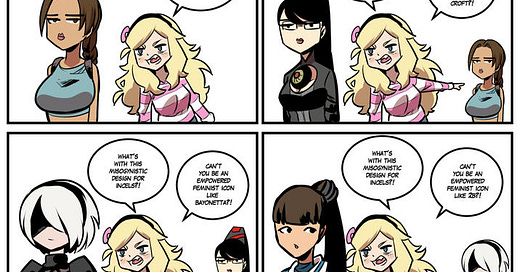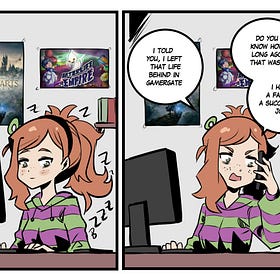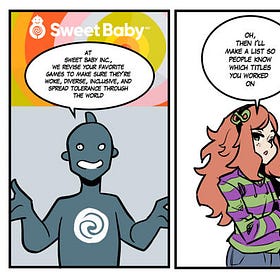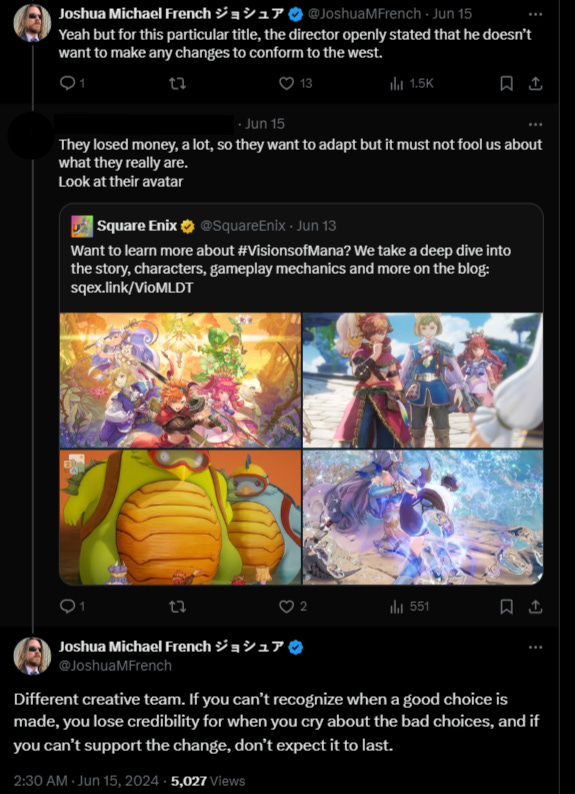Gamergate 2.0 at the Crossroads
Even as Gamergate's Second Coming becomes a mainstay in gaming discourse, with growing tensions within and beyond, what future awaits it?
Much has been written about Gamergate 2.0 since February 2024 by various people on every side, myself included. Having become a mainstay in gaming discourse, it’s become difficult if not borderline impossible to ignore even so much as indirect mentions of it, be it out of derision or otherwise. Tensions within and beyond, however, have put the nascent movement at a crossroads, if not an impasse. New questions have arisen: What future awaits it? What comes next? Would it be for the best?
The Second Coming of Gamergate
If anyone familiar with video games were asked what consultancy firm Sweet Baby Inc. (SBI) does at the start of 2024, chances are they wouldn’t be aware of what it even was. If one tried to make a connection between that and the Gamergate controversy, as I touched on through the lens of the KotakuInAction subreddit back in December 15, 2023, it would se…
The Second Coming of Gamergate: Immediate Post-mortem
Usually when it comes to post-mortems, they’re penned long after the posts being commentated on were published. In the case of the Second Coming of Gamergate piece, it’s more than just an ongoing event. Enough has happened within less than a week of that article to warrant its own, rather than just slap on an addendum.
To understand these requires a dive into not only how the events that spurred the movement began in the first place are being rewritten, be it by those responsible or their erstwhile allies. It also means seeing how the escalation of the culture wars over the past months, on every side of them, has left an impact on those claiming to lead the charge for gaming.
Investigative Harassment
On June 6, 2024, Bloomberg reporter and Kotaku alumnus Jason Schreier released a deep dive on Rocksteady Studios’ infamous flop Suicide Squad: Kill the Justice League. Claiming to use testimonies from two dozen (and largely-anonymous) sources, the article tells of corporate mismanagement, as well as a development house in managerial and financial turmoil. Yet at no point is the game’s quality, let alone consultancy firm Sweet Baby Inc.’s involvement, mentioned in any way. As it turned out, this was more than just editorial oversight. When questioned on social media why the topic wasn’t so much as acknowledged, Schreier not only dismissed the elephant in the room outright, but referred to the entire affair as “chasing angry hallucinations created by grifters.” Anyone who so much as mildly criticized those remarks were subsequently blocked, regardless if they never interacted with him before.
More than just a sleight-of-hand, this had the effect of forcing a dichotomy of “corpo” hijinks versus a conspiratorial witch hunt over nothing, especially once figures like Dutch-Egyptian developer Rami Ismail tried to make the article viral. A cursory look alone at what critics and fans were saying at the height of the backlash suggests that they’re as vocal over executive meddling as they were with the writing and any other aspect. Schreier using his piece as glorified moral grandstanding also came off as though designed to stifle discussions around smear campaigns he instigated, such as that against industry figure Ken Levine as noted by Brad Glasgow back in 2022. To say nothing of how this revised narrative of SBI’s staff having little to do with the game only raises more questions. If they were such an non-factor, then what explains the considerable effort to cover for them and smear those who disagreed?
As gaming Youtuber SmashJT, whose vocal criticism of Kotaku led him to set up a “Kotaku Detected” list curating individuals associated with the games media site, learned firsthand, trying to find that out can invite disproportionate retaliation. As he explained in a detailed June 10, 2024 blog post, this began when Second Wind co-founder Nick Calandra posted a thinly-veiled call to action on May 26 in order to target the “funding sources” of those criticizing him and his journalist friends. This was followed up on June 5 by Kotaku senior editor Alyssa Mercante, in which she used SmashJT’s full legal name (which he never made public) and a few days later by Twitter/X account @airbagged (with over 22,000 followers on the social media platform) dragging his former employers into targeted discourse while smearing his family.
These harassment efforts culminated in a video and article published on June 13, with SmashJT recounting how Chris Kindred of SBI notoriety had contacted those same former employers via email and phone calls, specifically to smear the critic as going after minorities. This had also inspired a copycat supporter around the same timeframe, whose messages were easily traced back by the Youtuber. Granted, cataloguing individuals can slide into a grey area, even if done strictly with publicly available information in spite of Kindred’s accusations or those of other instigators. Reporter Peter Pischke, during the leadup to the revelations, had criticized the practice as potentially penalizing "wrong think,” which could set a negative precedent especially in the hands of bad-faith observers.
Yet whether it’s Kindred’s behavior or Mercante setting up a “hit list” against Youtubers and others deemed a threat for whatever reason, it’s clear that not only have the original culprits of Gamergate 2.0 not learned their lesson, but also consider crossing ethical lines to silence opposition fair game. No bad tactics, when the “targets” are deemed acceptable.
Rifts in Momentum
While as the momentum hasn’t faltered, rifts have been emerging among those carrying the Gamergate 2.0 banner. Perhaps exemplary of these internal tensions is industry veteran Mark Kern, himself the target of myriad harassment campaigns from game journos.
Going by @Grummz on social media, his prominence at the forefront only grew following his involvement in the #FreeStellarBlade online campaign that emerged in light of censorship in outfits and gore over Korean studio Nexon’s top-selling Stellar Blade following its April 26 launch, apparently at publisher Sony’s behest. By the week of May 24, the petition had garnered significant media attention and over 90,000 signatures, with Kern going so far as to declare victory amidst news of the developers seemingly reverting the changes. Not everyone agreed, however, with a Japanese games translator going by Matt online surmised that no meaningful action had been achieved due to a lack of clarity on the affair. Devon "ShortFatOtaku" Del Vecchio even argued that the perceived censorship was more likely due to complying with Korean copyright laws regarding fashion brands than hijinks from Sony or the studio.
Games journalist Colin Moriarty on June 5 commented about how misguided the culture wars had become if Stellar Blade censorship was such a focus, and that those at the “tip of the spear” are not up to that task of confronting more legitimate issues facing the industry, such as racist hiring practices (as previously encouraged by groups like Black Girl Gamers) and ideological capture. A day earlier, however, those words were put into practice when Kern went off on an outburst on social media, as archived by independent game reviewer SidAlpha, calling for the censorship of anything deemed woke for content “marketed to kids” and how using principles means nothing against enemies who not only lack them but are all too willing to use those same things against others. Setting aside how there already are rating boards like the Entertainment Software Rating Board meant as a compromise to mitigate censorship, this didn’t do much to shake off those echoes of “no bad tactics.”
From what could be gleaned, this was uncharacteristic for someone who had previously been all for creative freedom. Perhaps it’s due to stress over the harassment faced from Calandra and his followers around that time, or this had always been brewing beneath the surface as less charitable critics believe. Regardless, despite erasing all traces of these from his account, Kern’s comments not only lent ammunition to those convinced that the movement was a hate mob, but also met pushback from his own side. Romanian Youtuber Vee disagreed with resorting to censorship as the solution when woke stuff “doesn’t sell.” Glasgow considered it hypocritical to defend creative freedom for one side and deny to another. Bounding into Comics contributor Nerdigans Inc., meanwhile, went further and outright compared those statements to what moral guardians in the 1990s and 2000s did.
Kern emerged relatively unscathed, however, remaining as active and vocal as ever. That episode nonetheless betrayed how the rifts over the movement’s direction, and those claiming to be at the forefront, had grown more pronounced. Beyond questions over whether gamers and sympathetic developers are leaving any lasting impact on the gaming industry, there’s a tangible air of pessimism, while hyperpartisanship threatens to stymy efforts at solidarity even as former critics found themselves on the same boat. Much as in the original Gamergate’s later stages, it’s not hard to see why some seem increasingly entranced by having an eye for an eye. In the face of enemies who not only hate them but want them dead, all bets are off. If that means protecting children from ideas deemed woke, or shutting down creators with the wrong politics even at the risk of rekindling old moral panics, so be it.
At the Crossroads
With gamers at a crossroads, it begs the question of where next. The most tempting path ahead is one presented by Youtuber Dimitri Monroe back on April 27, arguing that Gamergate 2.0 should abandon “optics” altogether. Where Gamergaters previously wasted too much time defending themselves or highlighting how their enemies are the real sexists/racists, this time around their successors should simply not back down, regardless of what others say. Much of what’s argued by Monroe makes sense, especially with how the opposing media landscape (even with the likes of Schreier, Calandra and Mercante still around) is a far cry from 2014, and larger commentators continue to take notice. Yet while this would deny culture warriors and ideologues alike an opening to exploit, there are limitations. After all, while there’s no point arguing with those who want them gone, not everyone is in that category.
More concrete action, perhaps, can be found with Kabrutus’ Sweet Baby Inc. Detected group. Not only has the Steam community grown to include over 405,000 members as of June 25, but it’s expanded into its own website, known as DEI Detected. While its scope has evolved to catalogue titles with censorship and any notable involvement from DEI/ESG consultants rather than just SBI, it still retains the same standards befitting an informative curator. Where there are articles and videos explaining why certain entries are listed, with the more opinionated pieces also having next-to-nothing to suggest harassment. That being said, aside from boycotts, platforms for discourse and passing mention of other games, there’s a noticeable dearth of alternatives presented by the Brazilian gamer. From what can be gleaned, however, these aren’t lost on him either, and remains committed to reaching out to sympathetic elements in the industry.
One notable person he reached out to is Joshua Michael French. The Project Lead for Hong Kong-based independent publisher Eastasiasoft, known for supporting uncensored Japanese and Chinese titles according to a 2023 Tech-Gaming interview, French had grown more vocal with the idea that there’s been too much negativity in the discourse. The way forward, as remarked in a spirited June 14 post on Twitter/X, may be to actively promote works and developers that “consciously try to do right by players,” whether it be games like Stellar Blade, or Square Enix’s Visions of Mana. This also means being willing to acknowledge that the realities of the gaming industry don’t lend well to absolutes or punitive measures. Instead, it’s better to have more carrots than sticks, and if that means giving credit where it’s due, even to individuals and studios seen as bending the knee or guilty by association, so be it.
Inevitably, these ideas would meet pushback, if not derision in certain corners. French’s compromise towards “credibility,” for instance, can come off as clashing with Monroe’s objection over optics, while Kabrutus’ cataloguing retains the risk of being exploited by bad actors, similarly to SmashJT’s list. Yet while not the most ideal, let alone the most cathartic of ideas, they nonetheless present viable, pragmatic and flexible enough steps forward for the long haul, at least until the industry fallout runs it course, as Kern once mentioned in a Side Scrollers podcast. More importantly, these reveal that despite tensions within and beyond, the movement’s desire to not just oppose those trying to co-opt what gamers love for their own ends but also uphold creative freedom remains an intact and inspiring enough for many to rally around.
Though it remains to be seen if such efforts prove lasting, or history will repeat itself, these do seem to suggest that there is light at the end of the tunnel. It may be dim, subject to change, and ever so elusive. Then again, whatever happens, it would be worth seeing whether Gamergate 2.0 can meet that challenge.















Great piece!
It's been surprising how much of this discussion has grown in a positive direction and people are tempering their expectations to be more realistic. I think a big difference between GG1.0 & 2.0 is that this time around there are more institutional actors & people who learned the correct lessons the last time around.
Obviously this isn't true of everyone & there's lots more for people to grow, or I guess in some cases, to be ignored, but overall it feels like it's more positive than negative to me.